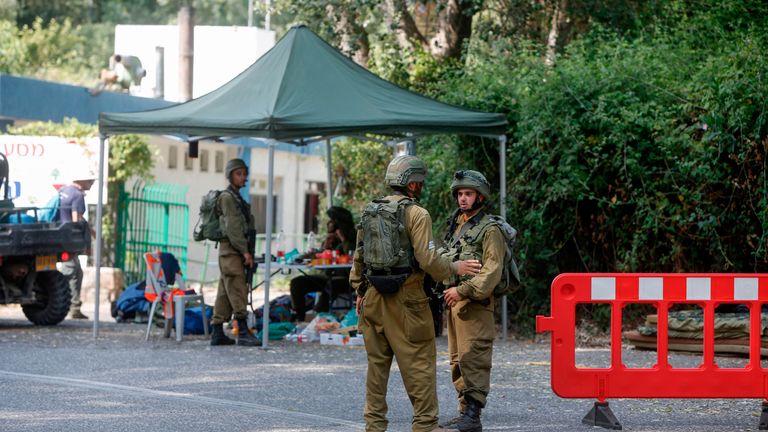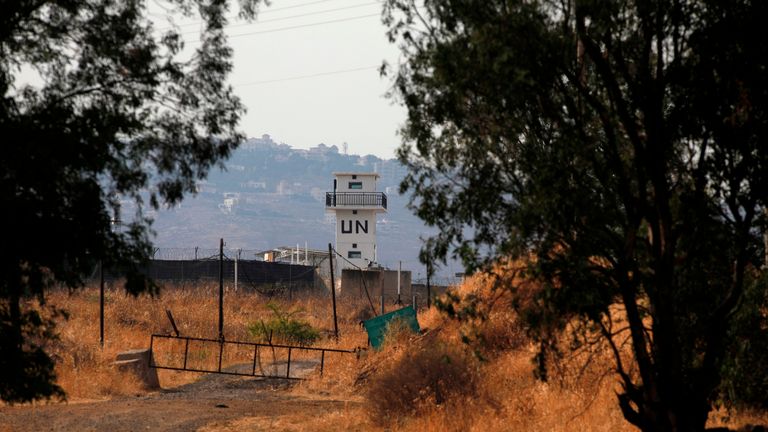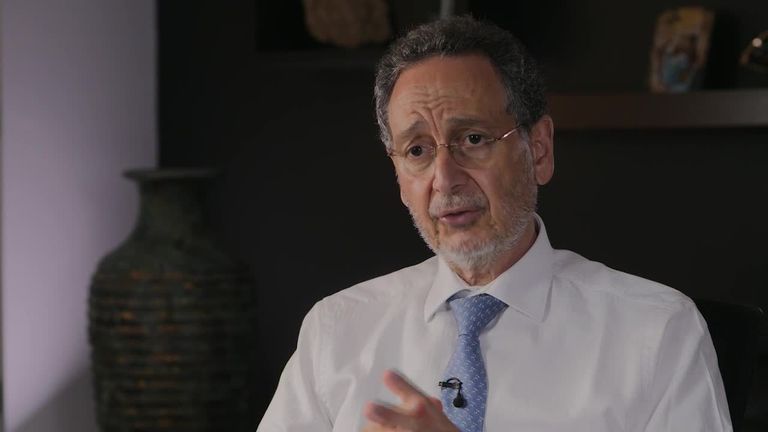Israel’s military says it has exchanged fire with gunmen linked to Lebanon’s Hezbollah militant group.
The incident on Monday afternoon represents an escalation of tension along the border shared by the two countries.
According to the Israeli Defence Force (IDF), a "terror squad" crossed the UN administered Blue Line on Israel's northern border with Lebanon on Monday afternoon.
A spokesman for the IDF said that Israeli soldiers had "successfully thwarted an infiltration attempt... a group of terrorists crossed Blue Line. [We] monitored and tracked them."
The spokesman said Israeli forces "engaged... with small arms and tank fire". Artillery was also used to create a smokescreen by the IDF.
Israeli civilians living in the area were ordered indoors for an hour after the clash took place.
The Israeli Army said that the militants had crossed back across the border after the exchange of fire and that there had been no Israeli casualties.
In Lebanon, Hezbollah rejected the Israeli account of the clash, insisting that none of its operatives had been involved in any incident.
In a statement, Israeli Prime Minister Benjamin Netanyahu said: "Today, a Hezbollah cell infiltrated into Israeli territory. Thanks to the successful operational deployment of forces on the ground by its commanders, the IDF thwarted this attempt.
"We view the effort to infiltrate into our territory with utmost gravity. Hezbollah and Lebanon bear full responsibility for this incident and for any attack against the State of Israel emanating from Lebanese territory.
"Hezbollah needs to understand that it is playing with fire. Any attack against us will be met with great strength.
"Nasrallah (Hezbollah's leader) already made a major mistake in underestimating Israel's determination to defend itself and Lebanon paid a heavy price for this. I suggest that he not repeat this mistake."
The pro-Hezbollah Al-Mayadeen media outlet claimed that no Hezbollah fighters had been killed during any incident.
Tension along Israel's northern border with Lebanon - which is supposed to be monitored by a UN peacekeeping force - have been heightened after the death last Monday of a Hezbollah fighter Ali Mohsen.
Mr Mohsen was killed in an air strike in the Syrian capital Damascus. Israel was blamed for the attack.
Over several years, Israel has conducted numerous covert strikes on Hezbollah and other Iranian-backed groups in Syria - an attempt by Israel to counter a perceived threat by Iran and its regional proxies.
Israeli intelligence assessments have repeatedly concluded that Iran is trying to supply its allies in the region with precision guided missiles to be used to attack Israel.
Hezbollah has always vowed to avenge the killing of any of its fighters by Israel.
The area of the latest clashes is a disputed zone along the border known in Lebanon as the Shabba Farms and in Israel as Mount Dov.
Hezbollah and Israel fought a 34-day war in 2006. Neither side could claim victory and since then, sporadic clashes in the Shabba Farms area have been tolerated.
:: Listen to the Daily podcast on Apple Podcasts, Google Podcasts, Spotify, Spreaker
Both countries are now dealing with worsening coronavirus outbreaks. Lebanon is also experiencing a severe economic crash. It is therefore in neither side's interest to escalate the tension now.
But both sides still need to be seen to be retaliating to aggression by the other.
Last September, after two Hezbollah fighters were killed in Damascus, a barrage of anti-tank missiles were fired from southern Lebanon into Israel, narrowly missing an Israeli military vehicle.
At the time, a major escalation was seen to have been narrowly avoided by good fortune because the Hezbollah missile missed its target.
Israel has repeatedly complained that the United Nations Interim Force in Lebanon (UNIFIL) along the border is not fulfilling the UN resolution which put it there. The UNIFIL mandate is up for renewal by the UN Security Council at the end of August.
IDF commanders also accuse the official Lebanese Armed Forces of being influenced by Hezbollah militants.
Within hours of this latest clash, pro-Hezbollah politicians and media in the Lebanese capital Beirut were variously suggesting the incident was not a Hezbollah operation or a reconnaissance mission.
Whether or not this is spin or bluff to detract from a thwarted mission, the suggestion from Beirut is that Israel should still expect a retaliation for the killing of the Hezbollah militant.
https://news.google.com/__i/rss/rd/articles/CBMicGh0dHBzOi8vbmV3cy5za3kuY29tL3N0b3J5L2lzcmFlbC1leGNoYW5nZXMtZmlyZS13aXRoLWhlemJvbGxhaC1hcy10ZW5zaW9ucy1vbi1sZWJhbm9ucy1ib3JkZXItZXNjYWxhdGUtMTIwMzc1NTPSAXRodHRwczovL25ld3Muc2t5LmNvbS9zdG9yeS9hbXAvaXNyYWVsLWV4Y2hhbmdlcy1maXJlLXdpdGgtaGV6Ym9sbGFoLWFzLXRlbnNpb25zLW9uLWxlYmFub25zLWJvcmRlci1lc2NhbGF0ZS0xMjAzNzU1Mw?oc=5
2020-07-27 21:05:27Z
52780945086117




Tidak ada komentar:
Posting Komentar